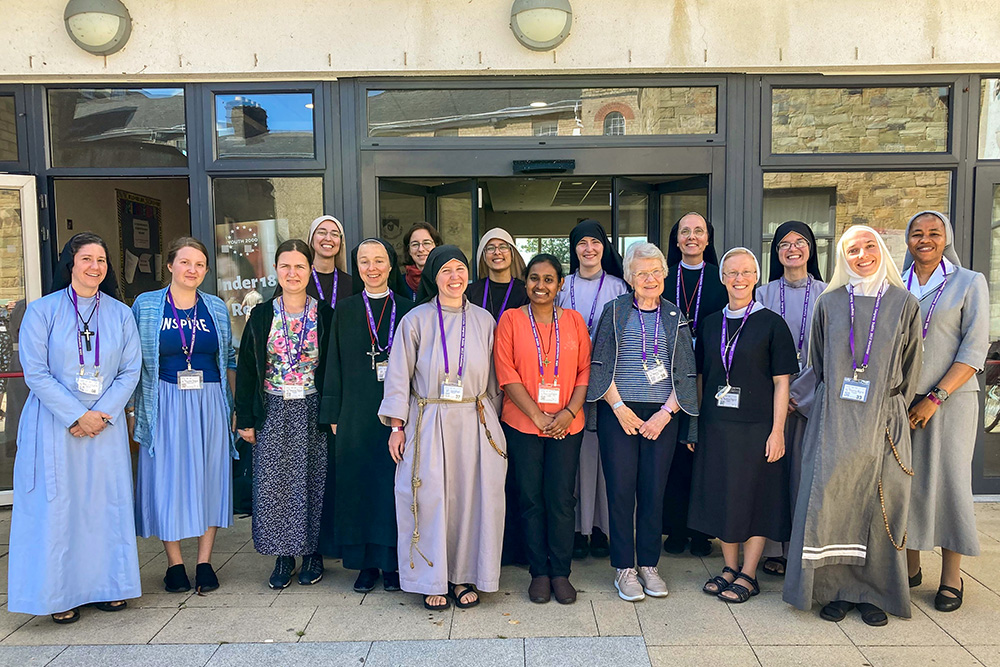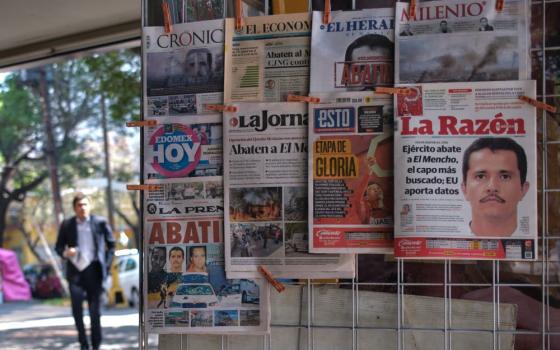
Religious sisters at the Youth2000 Summer Festival, held Aug. 7-10, 2025, in Kilmore, Ireland. (Courtesy of the Diocese of Waterford and Lismore)
Some people collect shells, or postage stamps, or thimbles. Our bishop "collects" religious orders! It might sound like the start of a joke, but there's evidence to back up our position. We have more than 20 congregations of men and women religious in the Diocese of Waterford and Lismore in Ireland.
In the decade he's been our shepherd, Bishop Alphonsus Cullinan has invited many new religious communities into his diocese, my own among them. He also honored the Dominican and Franciscan friars who closed houses in our diocese after being present here for nearly 800 years.
Some communities here have deep roots and a historic presence. For example, Blessed Edmund Rice, founder of the Irish Christian Brothers, is buried a little more than a mile from our house. Other communities in our diocese are newly founded, like the Sisters Poor of Jesus Christ, who began in 2001. My own community started in Italy in 1984 and this month marks nine years of our presence in Ireland.
Ten years ago, when I was a young temporary professed sister, the church held a Year of Consecrated Life. In his apostolic letter for the opening of that year, Pope Francis outlined three aims for the year: to look to the past with gratitude, to live the present with passion, and to embrace the future with hope.
In the subsequent decade, I've found this threefold approach to reflecting on religious life so helpful that it's become a kind of examen. And now, with a Jubilee Year focused on hope, I'm finding even more connections between these two church "years."
Looking at this history of religious life in Ireland is a mixed bag. The education and health care systems in Ireland (and the United States!) grew and flourished largely because of religious sisters. Even with the sorrowful chapters of Ireland's religious, the positive legacy of these orders remains evident even if the news media don't always draw our attention to it.
Advertisement
For all the new communities our bishop has invited to his diocese, we're still (thankfully) largely outnumbered by sisters and brothers with hundreds of years of history in Waterford. Beyond their impact in Ireland, Irish missionaries spread the faith all over the globe. My community opened a convent here as a thank you to the Irish church for all they had done for us.
Living the present with passion consumes most of my time and energy. I love being a religious sister. Certain experiences confirm and affirm my vocation, especially being around people who have never met sisters before and being with other religious men and women. This summer I got to do a lot of both of those things! Summer camps and youth festivals are two examples of how I get to collaborate with other religious to create a culture of vocations.
At Ireland's Youth2000 Summer Festival this August, the sisters held a vocation workshop. We were postulants, novices, temporary professed, and jubilarians — more than 20 sisters from 10 communities. The workshop was simply small groups of sisters and retreatants having informal chats.
I enjoy breaking down stereotypes about what a sister is like. I find sincere questions can often lead to deeper conversation. Many of the young people shared they had never met a sister before. Their interest was genuine and their questions sincere.
For me, it was an experience of synodality, of the church listening to each other together, and of missionary joy. These sisters could have been doing anything else on a Saturday, but they chose to sit and pray on a gym floor and listen to young people.
The Jubilee Year has also invited me to look at my posture of hope. It's challenged me to embrace, not simply talk about, the future with hope. Looking at the past with gratitude and living the present with passion helps me look to the future with a hopeful gaze. Collaborating with sisters in creating a culture of vocation fuels this hope. Having so many religious sisters (and brothers!) around us in Waterford makes this easier.
Perhaps this is part of Bishop Phonsie's rationale for inviting so many new communities to minister in his diocese. I see religious life alive and I have great hope for its future and its flourishing.
Have you thought about the Year of Consecrated Life at all in the past 10 years or revisited any of the excellent talks and reflections from that time? And as we're just past the halfway point of this Jubilee Year, what does "embracing the future with hope" look like for you?
Next month is the Jubilee of Consecrated Life. Do you have any plans to follow along? To really embrace the future with hope, we can look to the Extraordinary Jubilee of 2033. It's just eight years away — are you praying?





